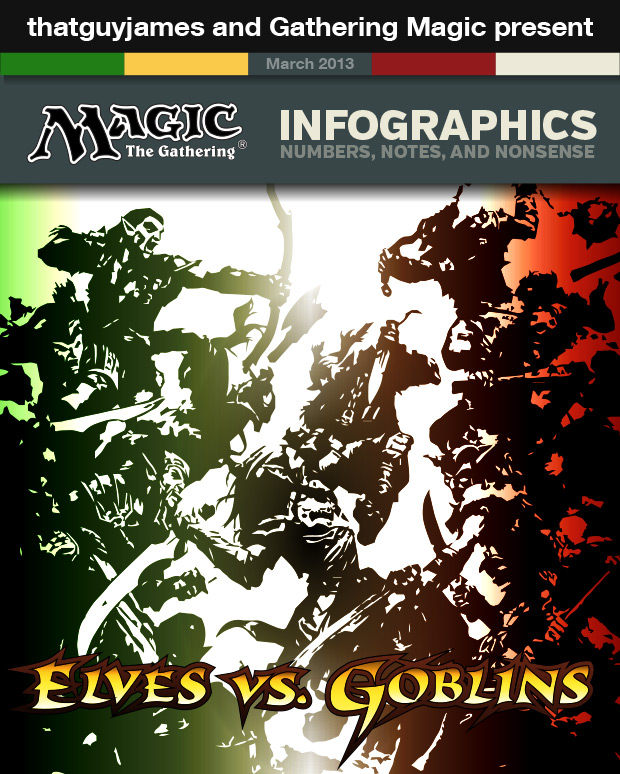A staggering amount of Magic content is published each day each day on a plethora of content sites, blogs, podcasts, and discussion forums. No matter how honest an effort you make, it's easy to fall behind and miss incredible articles because there just isn't enough time to read everything.
To that end, we've collected some of the best articles of the week covering a broad range of topics. If you're looking for articles, these are the ones you don't want to miss!
On Elves and Goblins
James Arnold is a fixture of the weekly round up for a reason. His infographics share a ton of information on topics that players are interested in, and he manages to do it in a way that is a lot of fun and easy to follow. This time James takes a look at the classic tribal rivalry between Elves and Goblins. Who comes out on top? There's only one way to find out.
GatheringMagic.com: James Arnold (@thatguyjames2) - Elves vs. Goblins

On Heroes and Dragons
Bennie Smith is well known for his love of Magic. In this article, Bennie discusses why Commander captures captures so much of what he loves about the game, and why the prospect of a Commander tournament with a prize for the winner worried him. How do you get players to think of Commander as an adventure, rather than a means to winning a prize? Bennie uses Vogler's interpretation of The Hero's Journey as a guide for helping the games be about the good times instead of the prizes.
StarCityGames.com: Bennie Smith (@blairwitchgreen) - The Hero's Journey
Why do we as humans love great movies, great television shows, great books, and great comic books? Because we love stories! And you know what? Magic gives us tools to tell great stories! Sure, at its fundamental core, Magic is a game of strategy and skill, of math and probabilities, of analysis and reason…but Magic is also a game of magic and artifacts, battling sorcerers and armies of monsters clashing, heartbreak and laughter, tricks and traps and miracles. A great Magic card isn't just a collection of stats and text, it's also the art and flavor text, all of it coming together to provide a distinct element of character or plot in the story of each game of Magic.
On Why We Play
Why do we play games, and what is the importance of playing? These are the questions that Natasha tackles in her article this week. Playing is important for developing creativity and problem-solving skills, but is there a distinction between good and bad kinds of play? One of the reasons Magic is so well loved is because it forces the players to think in many directions at once. Natasha defines these thought patterns and discusses their importance in other aspects of our lives.
GatheringMagic.com: Natasha Lewis Harrington (@natasha_lh) - The Play Paradigm, Part One
Play is among the most powerful developmental tools children have, and that doesn't necessarily change after we grow up. I've always been drawn to the aspects of psychology that tap into the natural urge to grow and heal—positive psychology, self-determination theory, humanism. Given that I basically came of age reading Making Magic, Savor the Flavor, and Latest Developments in between textbook chapters, this should be no surprise.
And so, to genuinely understand play, it is important to understand how the concepts have been repackaged to look “serious” but are still identifiable. Rather than the empty escapism I feared it to be, I realized that play can be expansive and inform our entire lives.
On Technology in Magic
How does technology fit in with the flavor of Magic? This week Vorthos writer John Dale Beety takes a look at which modern concepts have made the jump from reality to cardboard, which haven't, and the difference between the two. Why were living weapon Germs such a big part of the Phyrexian invasion of Mirrodin while guns and other technology don't tend to show up unless they are powered by or used for magical purposes?
StarCityGames.com: John Dale Beety (@@jdbeety)- Magic's Technology
Magic: The Gathering has a wide range of settings and associated technology levels, which don't necessarily correspond to popular conceptions of how advanced past civilizations were. Lost technologies such as the clockwork behind the Antikythera mechanism point to how fragile new discoveries could be in the face of war and social upheaval. The Romans had indoor plumbing and concrete. While the word steel evokes the Industrial Age at a minimum for most, both naturally occurring and human-made steel were in use in ancient and medieval times.
I briefly considered calling this article "Guns, Germs, and Steel," but that title was already taken. The first two items in the list, however, do illustrate the sides of Magic's technology and its uneasy relationship with the Tolkienesque and Dungeons & Dragons style of fantasy from which it took its start: gunpowder weaponry predates the usual cutoffs for the beginning of the Renaissance in Western Europe, while the germ theory of disease is far newer in the history of science.
On Modern in Kansas City
No matter what website you go to for strategy content, the metagame predictions you see are never going to exactly match what you see at your own tournaments. There is always a regional bias based on card availability and the kinds of players who live near the tournament. That's where an article like Matt Mendoza's comes in. Matt has started analyzing population and performance of the players and decks that show up to PTQs in the Kansas City region.
This kind of information is not only invaluable to the grinders in that region, it's also just plain interesting. What decks over or under perform relative to how well represented they were? How does the metagame shift from week to week? These are the kinds of questions that Matt tries to answer.
KCCompetition.Wordpress.com: Matt Mendoza (@mattmendoza) - Another Modern Metagame
Welcome to the second installment of A Modern Metagame. Last week, Omaha, Nebraska held its seasonal PTQ and 92 players Braved the Elements (first and last, I promise) to battle for a hotel room far away from the snow. In my research, I discovered that four of the Top 8 players at Omaha also played in Kansas City two weeks earlier. I spoke with two of them and I’ll use their changes, and the changes of the other two, to examine Modern more closely. I’ve also included the other four Top 8 lists from Omaha and some new meta information from other PTQs on the weekend to illustrate developments and innovation.
On Fblthp
Planeswalkers may be the face of the game, but some of the most beloved stories and characters in Magic are the ones hidden in the flavor text. One example of such a character is Fblthp from Gatecrash (Totally Lost). In this article, Matt Tabak shares the story of Fblthp and his work for the Azorius Senate. Matt writes this short story in such a way that you really get to know Fblthp as he gets torn away from his work in the Senate Gardens and unwillingly thrown into something much bigger than he expected.
DailyMTG.com: Matt Tabak (@TabakRules)- Fblthp
Fblthp had always hated crowds. He scooted down the busy Ravnican thoroughfare, his eye darting quickly from passerby to passerby. No one was particularly paying him much attention, which he liked. No one was particularly making any effort to step around him, either. He was nearly kicked half a dozen times before he made it to his destination.
The leatherworker and proprietor was human, but only technically. Burly as an ogre and twice as ugly, he towered over Fblthp and grunted. Fblthp meekly presented his satchel. The man grunted again and opened it. Bits of food fell out of his scraggly beard as he began to read—an impressive feat, all things considered. A thunderous noise rumbled out of the man as he went to a back storeroom. Fblthp blinked and eyed the food on the floor suspiciously.
After a time, the owner emerged and thrust the completed forms in Fblthp's direction. Fblthp bowed and turned to leave. The man rumbled again, but Fblthp wasn't sure why. As instructed, he turned toward the alleys behind the shop. Parisha, masquerading as a shopper at a nearby fruit market, briefly made eye contact with the homunculus as he disappeared into the alley. That made him feel better.
Fblthp walked down the alley, slowly but with growing confidence. He imagined Parisha and her comrades would be making arrests any minute now, and he could go back to the garden. He thought of the gently flowing waters of the garden's canals when a terrible crashing sound rang out behind him. He whipped around, expecting to see Parisha or one of the arresters. Instead, the dreadful shape of Vadax Gor emerged from the shadows. Fblthp dropped his satchel and whimpered.
If you have suggestions for next week's recap you can send them through to us on Twitter, or share throughout the week in the comments below.






















